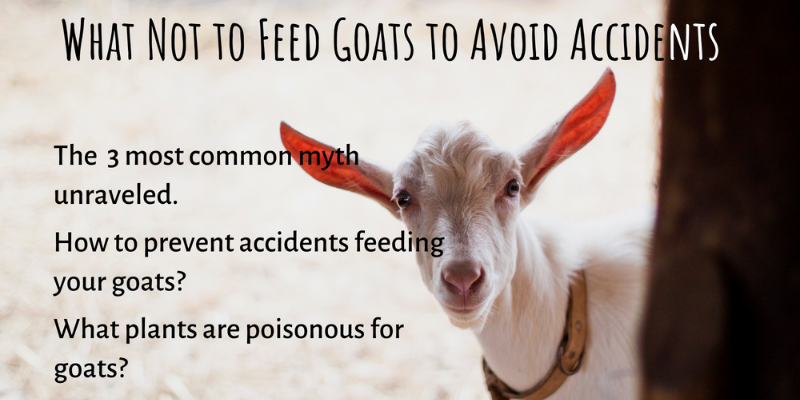
Where does the myth that goats can eat anything come from? And does that also mean that you can feed goats anything?
Fact is that goats are not only picky, but goats can also eat wrong things like plastic, chicken food and poisonous plants.
Don’t you believe me?
You will only need to check the fora on the internet to know what people’s goats have eaten that they should not have eaten.
In this blog I will give you a complete deal of tips on how you can prevent feeding accidents for your goats. So after reading this blog you will know how to prevent these accidents from happening. This will save you a lot of time and trouble in keeping your goats.
What is in this blog?
Goats have an individual taste and are a bit peculiar in what they eat considering wrong things.
Our goat Bianca eats black agricultural plastic when she gets the chance. None of our other goats are interested in the same plastic. Our buck Putin loved electric wires, luckily he was the only one on the homestead. Don’t worry, he is still alive, we sold him after he had done his job well.
Not all goats will eat things they should not eat. They might also not eat wrong things for a while and then suddenly pick up this bad habit. So better be safe than sorry and prevent your goats from eating wrong things.
Let’s first start to cut through some of the 3 most common myths about goats eating habits. Then we will look deeper into how to prevent goats eating the wrong things.
Why are these myths dangerous? Because it is very misleading and can lead to accidents. Being aware of the dangers of these myths you can avoid accidents and a lot of trouble with your goats.
On the contrary: goats are very picky.
You can clearly see this when you see goats foraging. They eat something here, then walk some steps and take a few bites there. They would not start at one end of the field and then work their way through the field to the other end.
In different times of the year they will also eat different things.
When feeding your goats they will get used to the feed you are giving them. After that it is not always easy to change the brand of the goat feed.
Why are goats so picky? It has a good reason.
Goats have a very sensitive digestive system that needs to stay in balance and does not take sudden changes . For that they have to be picky.
So when you are feeding your goats you can not just give them anything, you will have to be careful because of their sensitive digestive system.
Changing your goats food suddenly or giving your goats food that is not meant for them can be live threatening since their sensitive system might not take it. That is why this is a dangerous myth.
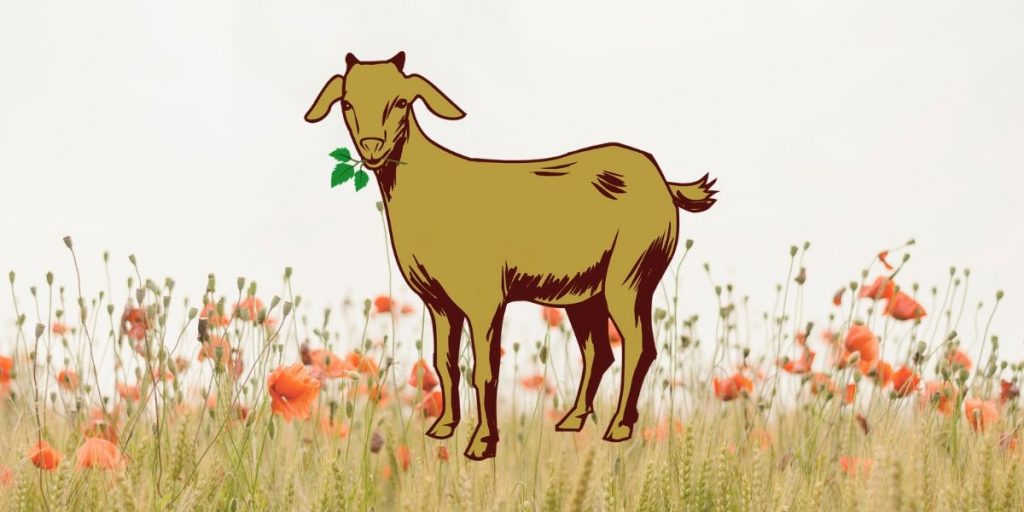
Yes, goats are picky for a reason. But does that mean they always pick what is best for them?
Here on the Homestead we do eat a lot of healthy stuff, you probably do to. But man, I really like those sweet cupcakes from the supermarket and I find it hard not to eat them. Or the nice chocolate pralines from the chocolate shop. They are so good. Do you recognise that?
It’s a bit the same for goats. They might not go for cupcakes (although some might…), but they do not always pick out the things that are best for them to eat. This can be cupcakes or plastic or poisonous plants with a sweet taste or many other things.
When goats eat to much of something that is bad for them it will disrupt the balance in their digestive system and can therefore be dangerous for them.
The way goats forage can be misleading to us considering poisonous plants for goats.
When plants are poisonous for goats it does not mean they will drop dead when they take a bite. Not all plants are equally toxic, the goat needs to eat a certain amount of a certain plant to get poisoned.
When goats are foraging they take a bite here and a bite there, including bites from plants that are poisonous to them. But because they forage the way they do, they will not eat a lethal dose.
It is only when poisonous plants are the only thing out there to eat for them when they get poisoned. This can also happen when goats get clippings served from a poisonous plant. There is a chance that they will eat it and get very sick or even die.
The misleading thing is that one might think goats will eat a certain poisonous plant because one sees them eating it. But then in the end it is not edible in larger quantities.
Examples of these plants are: azaleas in general especially rododendrons.
Like for example foxglove?
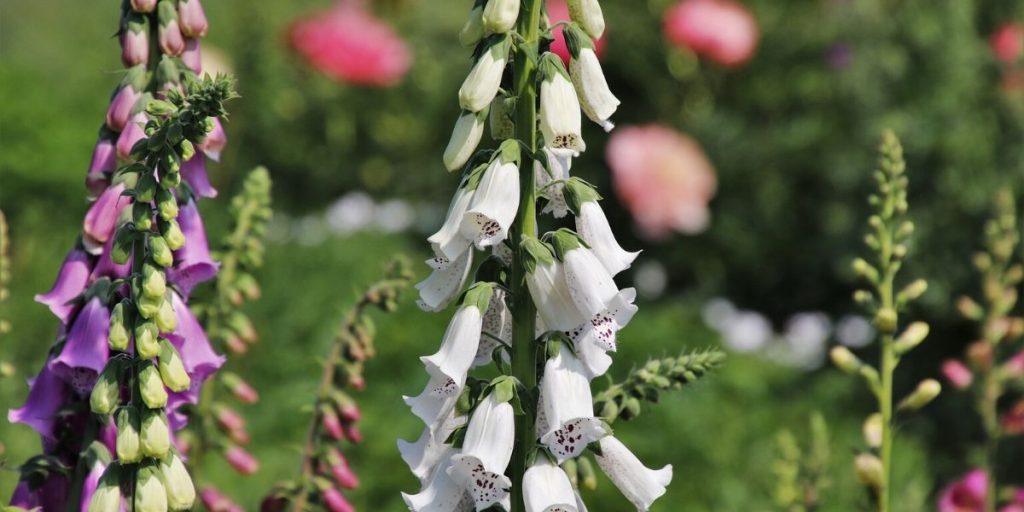
Goats do not have a mysterious sense for knowing what plants are poisonous for them. They smell and taste plants and then they judge whether they like to eat the plant or not.
Plants that do not want to be eaten and eliminated by the goats have a taste or smell the goats don’t like. Some plants go even a step further and make the goats sick if they get eaten by goats. And if the goats never the less keep on eating it, the goats will die.
Foxglove has a bad taste for goats. If you have ever seen a goat taking a bite of a foxglove leave you will have seen that it spits it out strait away. This is because the foxglove warned the goat: ‘hey I warn you! Do not eat me, I taste bad’. Even so bad that the goat will never taste it again.
Plants that do not warn goats that they are poisonous are e.g. azaleas (there might be others in your region). That is when the goats misjudge and eat it.
Still when there is lots around the way they forage will save them. But when e.g. the azaleas would be the only plant around or would be served to them, they would take a dose that would make them sick or even kill them.
That is how goats can poison themselves.
As a rule of thumb: You have to be careful and keep the non edible things away from the goats until you are sure no one in the goat family eats or drinks it.
Even then be watchful. When goat kids grow up or new goats are added to the herd they will eat what the older ones eat. But that does not mean they will not eat what the older ones don’t eat. So don’t think the job is done when your herd does not eat bad things when new goats are added to the herd…
In any case: make sure your goats have fresh water and hay available all the time.
Fresh water and hay are not only the basic food necessities, they can also help in case of poisoning.
By drinking lots of water the goat can sometimes neutralise a light poisoning.
Hay is for goats what brown rice is for humans. The fact that brown rise is a starch is not the important part in this case, what is is that It stabilises our digestive system when something is wrong. That is what hay does for goats, it stabilises their system. When something is wrong there is a good chance that hay will solve the problem.
Why? Because their system can’t deal with it. As you have learned earlier in our blog “Feeding goats, things you didn’t know.”, make link goats used to eat what the seasons would bring. Since the seasons gradually change from one into the other the diet of the goats would only slowly and gradually change as well.
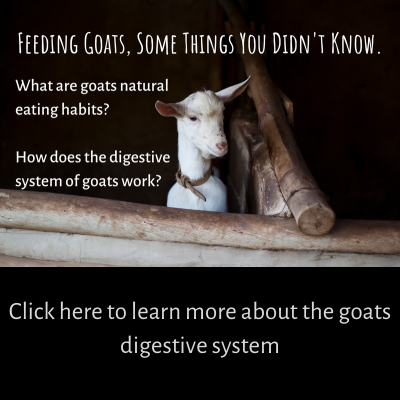 The millions of bacteria in the goats stomach that help the goats to digest their food are not just one type of bacteria. There are more than one type of bacteria present in their stomach at any moment. Some types would be good at digesting grass, others in digesting grains. When goats eat only grass, the grass digesting bacteria will be the fast majority and if the goats would only eat grains the grain digesting bacteria are in the fast majority.
The millions of bacteria in the goats stomach that help the goats to digest their food are not just one type of bacteria. There are more than one type of bacteria present in their stomach at any moment. Some types would be good at digesting grass, others in digesting grains. When goats eat only grass, the grass digesting bacteria will be the fast majority and if the goats would only eat grains the grain digesting bacteria are in the fast majority.
So what would happen if a goat that has only been fed on grass suddenly gets grains? It will not be able to digest the grain. Their digestive system will get into serious trouble. So much trouble that the goat can die from it.
Here is where the hay can help with the problem. When goats have hay available all the time it will be a substantial part of their diet.
In that case they would not only eat grass, but hay and grass. If you then change the grass for grain there is still the hay in the food that is the same. Still it is better not to make even this change from one day to the other.
The way to change feed is to always do it gradually. Mix in some of the new food with the previous food, then every day make the mix with a little more new food leaving out a bit more of the previous food. After a week or so the previous food will be replaced with the new food.
When your goats are living in a barn during the winter month and you feed them on hay and feed mix, it can be tricky to put them out into the green in spring. If the change is to quick they might get diarrhoea. It would be best to only let them eat the greens for a short time at the beginning. You can let them eat the greens a little longer every day until their system gets used to it again.
Bottom line is: never change a goat’s diet to quick.
Imagine what it would be like to be on your own field on your Homestead and harvest your own hay. Then dry it during those view dry days in the wet summer, turning it over and over with the whole family helping.
Smack! You suddenly realise that there could be poisonous plants packed into the hay….
And the trouble is the goats will not recognise the poisonous plants in the hay. Remember? Goats select what they eat with their smell and taste. Some dried plants lose their smell and taste. So the goats will not recognise them any more as poisonous.
The solution is simple but can be very labour intensive: you will have to check the field and if you find poisonous plants you will have to remove them before making hay.
After having done this for some years poisonous plants that seed themselves like Foxglove will not come back.
Plants that are propagating from their roots like Arum and Bracken are much harder to remove. You probably have to plough the field to get rid of them.
You might be lucky though and have no poisonous plants in your field….bit better check it.
Maybe it is a bit annoying to you that there is so much to know about what goats eat and so much to read about.
But see it like this: after you have read it all you are sure you will be doing the right thing with your goats. And avoiding trouble makes life with goats a lot easier, believe me.
The poisonous plants that are growing in your area can be totally different ones then the ones in my area. So be aware that any list given can be incomplete.
Here are some tips based on how I deal with this:

Rododendron, lethal clippings for goats.
There are some apps available that will help you. You take a picture and the app tells you which plant you are dealing with. Once you have the Latin name of a plant you can research in details on the internet.
A bit more complicated but still good is a plant guide. Look up the Latin name and you can do further research.
Check on one of the beautiful goats peoples Facebook groups and ask goat keepers what they are using. People are very helpful on these platforms.
I hope you have enjoyed reading this blog and to see you again.
Subscribe to this blog or connect to our Facebook or Instagram to stay posted.
Links for more information about goats eating habits and their digestive system: feeding goats, things you didn’t know
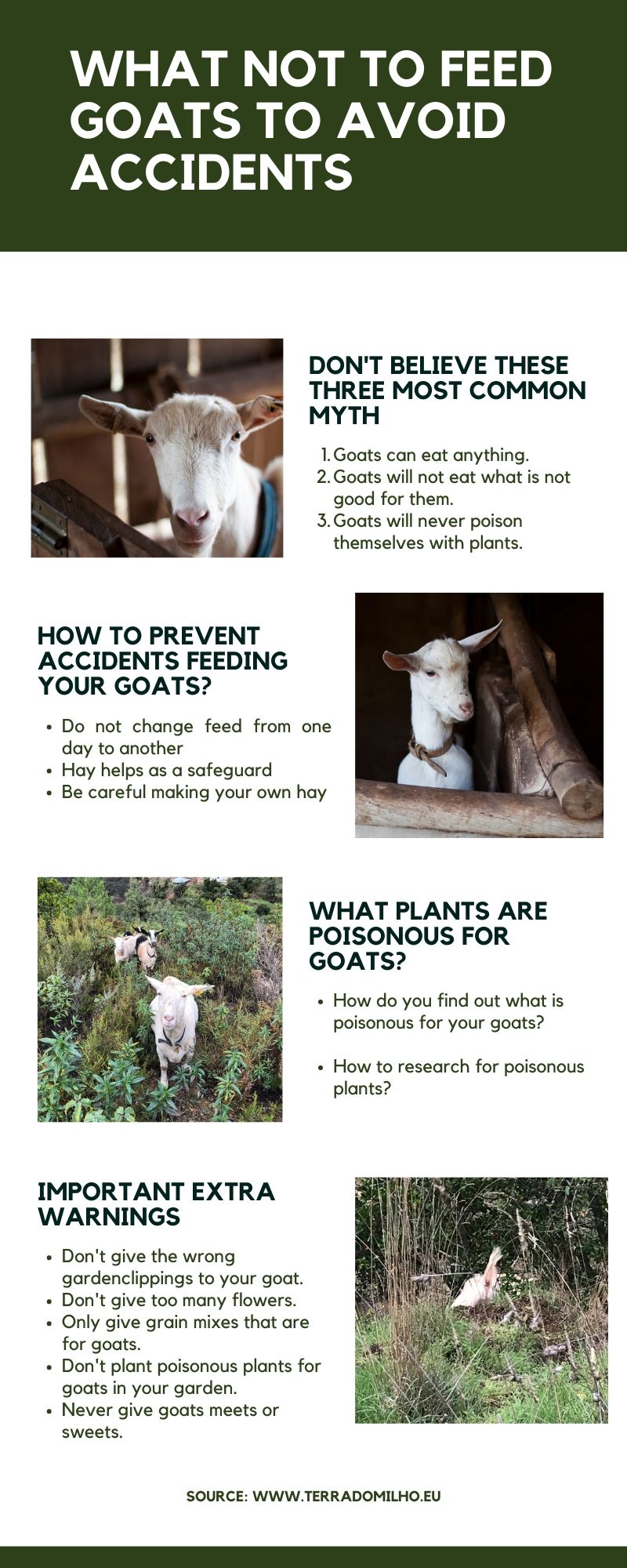
Het graasgedrag van de landgeit in Nederland, en verkenning (Grazing habit of the country goats in the Netherlands, and reconnaissance) Anneke de Vries & Nick van Eekeren,© [2007] Louis Bolk Instituut, the Netherlands.
Goat health – copper deficiency NSW Department of Primary Industries, Australia, September 2017.